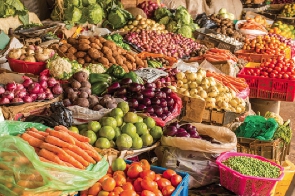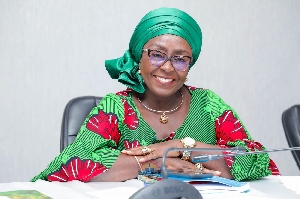Dr Gregory Afra Komlaga, Senior Research Scientist at the Council for Scientific and Industrial Research, says stakeholders in the agrifood sector have a key role in ensuring and sustaining food security in the sub-region.
They, especially food producers and processors, must deploy modern and appropriate food production and postharvest technologies to ensure availability of food for all.
Dr Afra Komlaga was speaking at the graduation ceremony of 20 first cohorts of the Agrifood Enterprise Programme and induction of the 50 second cohorts in Accra.
The programme was a comprehensive initiative that supported Micro, Small, and Medium agri-food Enterprises (MSMEs) in Ghana to unlock the full potential of their businesses.
The programme was implemented by the Africa Skills Hub Foundation and supported by the World Bank, Ministry of Finance and the National Entrepreneurship and Innovation Programme.
It supported young entrepreneurs in the food industry by providing and equipping them with comprehensive training and guidance that enables them to create and launch sustainable agri-business ventures.
He said it was for this reason that the programme was a welcoming news to Africa and for that matter Ghana.
Dr Afra Komlaga, who is also the Head of the Food Technology Research Division, CSRI said the programme supported the efforts being made by governments in Africa in fighting food insecurity.
He said food was one of the necessities of life and it provided nutrients that were essential for the growth, repair, and maintenance of body tissues and for the regulation of vital processes.
He said food production, preservation, processing, and distribution were crucial to ensure availability of food for the population of the world.
“The food manufacturing industry is also a vital component of the global economy; in providing jobs and essential products to consumers worldwide,” he added.
Dr Afra Komlaga said the sector was critical to ensuring food security and meeting the growing demand for diverse and high- quality food products.
“It is therefore not surprising that the agriculture sector is the most dominant sector of the economy of most African countries including Ghana,” he said.
He said unfortunately, food security remained a major challenge to the welfare of a large segment of the African population.
The Head of the Food Technology Research Division said food insecurity and malnutrition were major challenges confronting African nations with Sub-Saharan Africa having one of the highest burdens of undernutrition.
The two major contributing factors to food insecurity are inadequate food production and postharvest loss of food. He said according to the Food and Agriculture Organisation, about 30 percent of food harvested globally gets lost or wasted each year.
In sub-Saharan Africa, the statistics are much higher, especially for selected crops, where smallholder farmers lose up to half or more of their yield between the field and the fork.
He said though agricultural productivity had traditionally and increasingly received greater attention, the reduction of postharvest food losses also remains a critical means of increasing food availability on the continent.
There is also a high prevalence of malnutrition among the aged population in Africa and one cause of malnutrition in Sub-Saharan Africa is inefficient agricultural and industrial practices.
The use of appropriate food production and postharvest technologies, and food processing methods could contribute to food security by reducing postharvest losses, stabilizing food supply and seasonal prices.
Mr Kofi Nkansah, Chief Executive Officer of NEIP, said the government launched the Hubs Accelerated Grants Programmes to drive growth and Job creation in the private sector.
He said the programme was an initiative aimed at supporting African entrepreneurs by providing them with grants of up to $100,000 to scale their businesses.
The programme is open to entrepreneurs from various sectors, including agriculture, education, health, finance, and technology. It seeks to promote innovation, job creation, and economic growth in Africa.
He said MSMEs contributed 70 per cent to the country’s Gross Domestic Product and provided 83 per cent of employment, while 90 per cent of these businesses in Ghana were informal.
He said the government would continue to support in areas of access to funding, equipment and machinery support, access to market and technology and businesses development support services.
Mr. Daniel Amoako Antwi, Executive Director of Africa Skills Hub Foundation, expressed the hope that the beneficiaries of the programme would not just be business owners but also change-makers.
He said the trainees spent six months of intensive training, mentorship, and hands-on experiences, where they had adopted innovative practices, including sustainable farming and advanced food processing techniques.
He said the Foundation had designed an aftercare support system to continue to engage all trainees to grow with them in their businesses.
Six entrepreneurs were awarded soft loans of ₵10,000 each to boost their businesses.
Over the next one year, the programme will meticulously monitor the progress of these ventures to assess the efficacy of the support.
Business News of Wednesday, 8 May 2024
Source: GNA

















